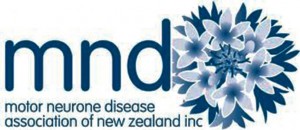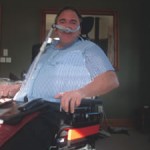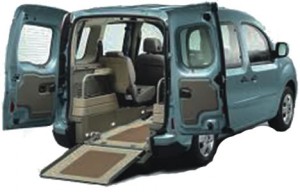Neil Ladyman – Motor Neurone Disease Activist
On the occasion of Motor Neurone Awareness Day, 21st June 2013
MM: Neil, is it true that you first suspected you had motor neurone disease on the squash court when you could not win a game against Fr Phil Cody?
NL: Yes. Phil Cody was in the Masters Squash Team that I manage and we had great times together. I found that I could not retrieve shots in the corner of the court. I went to a physio, did exercises like riding a bike but it did not help. And then I was walking with my father at Christmas when I discovered I could not walk very well any more because I developed a condition called ‘drop foot’ where the ankle loses its flexibility and the toes fold under.
MM: Was motor neurone disease already in your family when you were diagnosed?
NL: At the time my aunty had motor neurone disease when she got into her 80’s when she had some symptoms - I did not know of anyone else.
MM: How did your diagnosis come about? NL: An osteopath that I was seeing to try to get my legs working better, said to me kindly “Neil, I cannot treat you any more; I do not want to take your money. You really need to go to your doctor and see a neurologist, and they will do tests on you, and they will determine what is wrong“. So that was a first indication. And then the doctor sent me to a specialist, who sent me for an MRI scan for my back, to determine if there was some other reason that could be medically treated. When we visited him, he said, “There’s good news and bad news. The good news is your back is very good for your age – shows no problems that need correcting. The bad news is that you’ll now have to go to a neurologist.”
Then the neurologist performed a number of tests, and then said, “Your wife should have come in today, but go home and look on the internet about motor neurone disease and come back in a week with your wife.”
So I came home and my wife Olivia was on the internet. I said, “Can you look up motor neurone disease and tell me what it’s like, what I should do?” She looked it up and the corner of the screen said, “Average life expectancy, two to five years.” She covered it up with her hand, turned to me and said, “Neil, we’ll go on that overseas holiday that you’ve always wanted to go on.” Now that shocked me because for years my wife Olivia was afraid of flying and we would not go overseas. We’d both travelled before but after having children she was unable to fly.
MM: How did you see your diagnosis in the light of your Christian faith?
NL: My specialist doctor had a picture of Jesus on his shelf, so I said, “Are you a Christian,” and he said, “Yes.” Well, that was very good for me and then we prayed in his office together. He was the first specialist I saw, so right at that point, before I was diagnosed with motor neurone disease, I had the covering of the Lord through the medical contact.
Now my Christian walk has been strengthened after receiving the news that I had motor neurone disease, because my hope is in the resurrected Lord Jesus, and as he was resurrected he said, “I have defeated death. You will be resurrected with me, and your body will be healed.” So my hope has been firmly established – no matter what happens to me here, I have a hope secure in the Lord Jesus Christ.
MM: Thank you for that, Neil. Now you agreed to be part of a drug testing programme, and you found at the end that you were taking a placebo. How’d you feel about that?
NL: It involved nine trips to the USA and cost about $20,000. I took part because really research into motor neurone disease was really the only way I might have been able to get access to any drug that might have helped. What happened was that I had to decide very quickly to go on this trial, and I prayed with Olivia and a Christian friend and we talked about it and they asked, “Now, why are you going on this trial?” And I agreed that I was going on this trial to be the Lord’s representative and to help anybody in the future, not only for my benefit, but for the benefit of every other person in the future that might have motor neurone disease. Having the placebo did not matter, it was still good that I was on the trial because as a Christian, if I got the placebo, my future was secure anyway, and others that got the drug, they may not be a Christian and I would be able to help them and they might have a longer life.
MM: A Christian outreach, in a sense?
NL: Yes, but it was also very clear that as my disease is genetic, and may pass down the family line, but I’m praying against that, so my investment in the cost of doing it was very much about investing for the family and other people .
MM: You encouraged motor neurone disease sufferers to use their breathing pumps during the day as well as at night. Why did you do that?
NL: My experience was that I was getting very tired, and a lot of motor neurone disease people get very tired, and I got to the point where I could not hold a conversation, was sleeping most of the day, my toileting was bad, everything in my body started shutting down. Then they gave me a special breathing machine for use at night. So I started using it at night, and when I woke up the first morning it was like the sun was shining, and I looked at my wife and said, “I’m going to apply to NASA to be an astronaut”. I had so much energy that morning; it was best night’s sleep I’d had for a long time, and so then I decided, why not use it during the day, it kept me very active – I can go to restaurants, movies, I can go to meetings, and talk almost continuously.
MM: What about the peg you have inserted in your stomach for food? How do you manage that?
NL: Part of motor neurone disease is that as our tongues and throats stop working we can have an alternate way of feeding. The peg is a tube into my stomach that enables me to ingest a complete food substitute into my stomach. People can also put a little bit of wine or brandy or mix up some soup – the tube is large enough to take products as long as it doesn’t clog the tube. And at the moment I just have it ready in case my mouth stops working. It was very easy for the operation and I’ve had no trouble since; a very simple device.
MM: You have a modified van to take a wheelchair. Are you happy with that?
NL: Yes, it is called a Renault Kangoo. It’s like having a car at the front and a little van on the back. It’s actually a French postal van, so by having two sliding doors on the side and fold-out doors at the back with a little ramp on it, I can now go to church, get out in town and travel with my wheelchair. That has helped me very much, and involves a driver. A lot of people can drive it; it is a very good vehicle.
MM: What would you like people to be aware of about motor neurone disease?
NL: What I feel is that people need to slow down with motor neurone disease patients and spend time with them. There was a book written and a film made called Tuesdays with Morrie which says it all; and I strongly encourage people, if you have a friend with motor neurone disease, choose a day of the week that you will offer to go round, maybe read a book, the Bible, maybe type for them, because at times our hands don’t work. Friends offer different times of the day, and it might be just an hour at a time.


 Entries(RSS)
Entries(RSS)